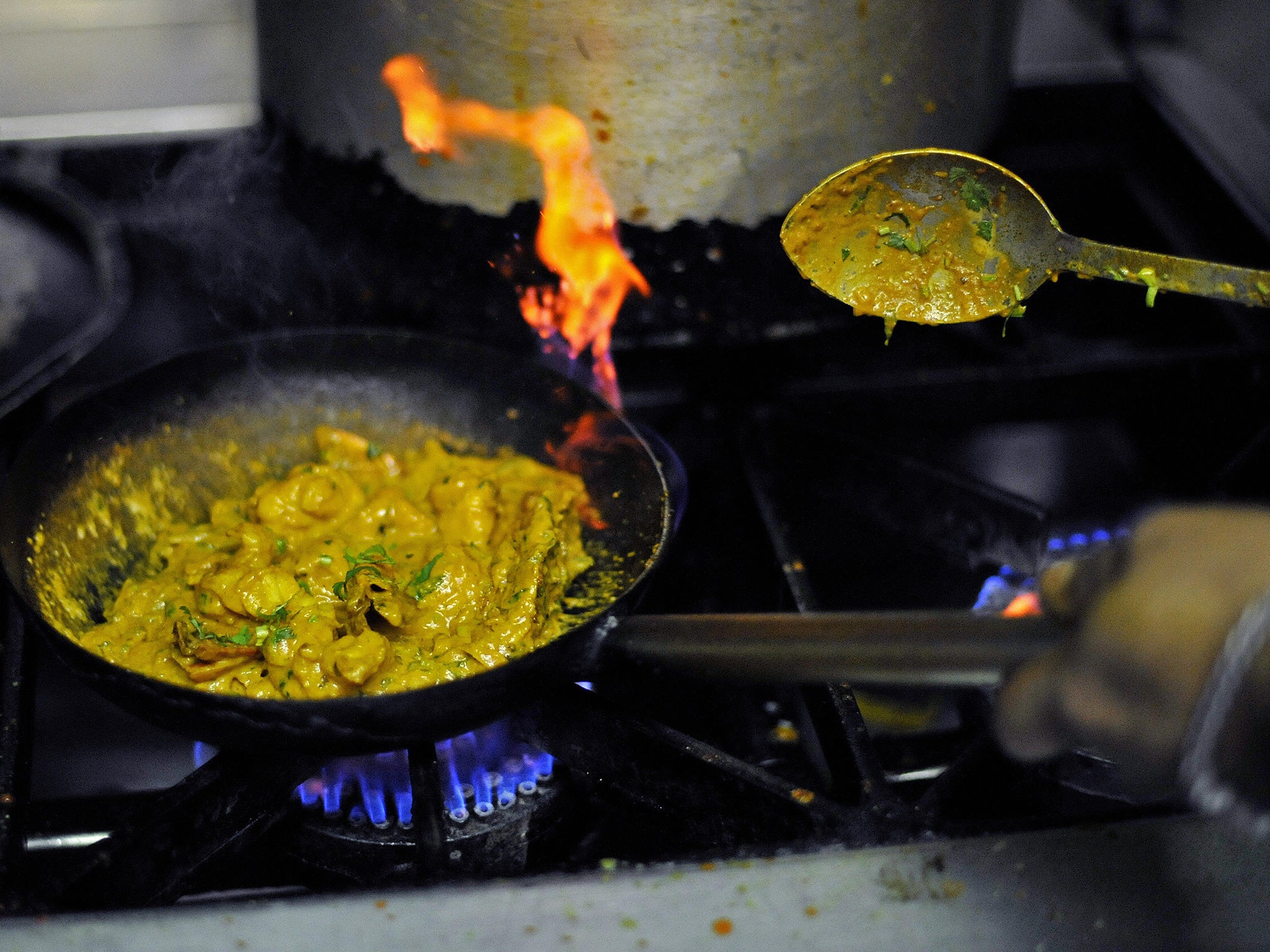Now Cameron's tough immigration rules could mean the end of the great British curry night
Thanks to visa regulations, curry houses are struggling to fill their kitchens with skilled chefs who know their way around a spice rack

Your support helps us to tell the story
From reproductive rights to climate change to Big Tech, The Independent is on the ground when the story is developing. Whether it's investigating the financials of Elon Musk's pro-Trump PAC or producing our latest documentary, 'The A Word', which shines a light on the American women fighting for reproductive rights, we know how important it is to parse out the facts from the messaging.
At such a critical moment in US history, we need reporters on the ground. Your donation allows us to keep sending journalists to speak to both sides of the story.
The Independent is trusted by Americans across the entire political spectrum. And unlike many other quality news outlets, we choose not to lock Americans out of our reporting and analysis with paywalls. We believe quality journalism should be available to everyone, paid for by those who can afford it.
Your support makes all the difference.“Every country needs firm but fair immigration laws,” said former Foreign Secretary Robin Cook in 2001, as a prelude to claiming that successive waves of migration since the Second World War had created a new and better type of British society. Looking for a powerful hook upon which to hang his vision of an open, multicultural society, Cook located it in the nation’s favourite dish: chicken tikka masala. The fusion of “Indian” chicken tikka with the type of thick gravy favoured by many UK citizens “is a perfect illustration of the way Britain absorbs and adapts external influences,” he claimed.
Fast forward 14 years and whatever benefits chicken tikka masala has generated in terms of everyday multiculturalism the dish is no longer the nation's number one choice when dining out in British Bangladeshi, Indian, Nepalese or Pakistani -owned restaurants. That honour goes to chicken jalfrezi, a spicier dish than the sweet, bland masala. But whatever your choice in Anglo-South Asian cuisine you should be aware that the clock is ticking on its future.
More on this:
Indian restaurants to lobby David Cameron for short-term work visas to plug chef shortage
Spicy food 'can lower the risks of early death'
Why? Because skilled workers, including chefs, from outside the EU are now required to earn at least £29,570 a year before they can gain entry to the UK. This is considerably more than the average chef can earn, even in very profitable central London restaurants. It’s far more than is on offer to most Bangladeshi-origin chefs who run the curry kitchens of around 80 per cent of the nation's 10,000 South Asian restaurants and takeaways.
Most of the children of the original south Asian chefs who migrated to Britain during the 1950s and 60s have gone on to benefit from a British education, encouraging them to study for longer and pursue careers away from the family business. It’s hard for the Indian restaurant sector, now worth around £4.2 billion to the UK economy, to replace the talent it is losing.
The problems being caused by changing immigration rules have been anticipated by curry chefs for at least six or seven years. In that very British way, restaurant owners have muddled through hoping that something will turn up. However the alarm bells began to ring very loudly at the headquarters of Cobra Beer when chairman Lord Karan Bilimoria discovered that on average two curry houses are closing each week because of the shortage of chefs.
Although the Home Office claims chefs with in-demand skills will be welcomed in to the UK, business owners are taking matters into their own hands. For obvious commercial reasons the Hyderabad-born crossbencher decided that something had to be done. So he has signed up some of the UK’s finest Indian-born chefs – Vineet Bhatia, Atul Kochhar and Vivek Singh – to spread the word to young people of any ethnicity that they have a bright future in Britain if they train to prepare exquisite South Asian-inspired dishes. I sincerely hope that the Bilimoria initiative works.
Forward thinking business owners are also changing their offer to reach out to western chefs, and new customers. The street food revolution, which has blossomed in car parks and unused buildings of Hackney and Lambeth, is now rippling out to the rest of the UK and it is changing the way young people of all ethnicities think about eating out. A handful of South Asian restauranteurs have kept an eye on the dynamics of this very profound cultural shift, including the Bombay Parsee-themed Dishoom chain in London.
While the Michelin–starred Indian restaurants based in Mayfair have a rosy future because they float on an ocean of money, for high street curry houses to survive the skills crisis will require some clever thinking and a willingness to reach out to skilled chefs who don’t require a visa to bring their culinary curiosities to British tables.
Dr Sean Carey is honorary senior research fellow in the School of Social Sciences, University of Manchester and a fellow of the Young Foundation
Join our commenting forum
Join thought-provoking conversations, follow other Independent readers and see their replies
Comments